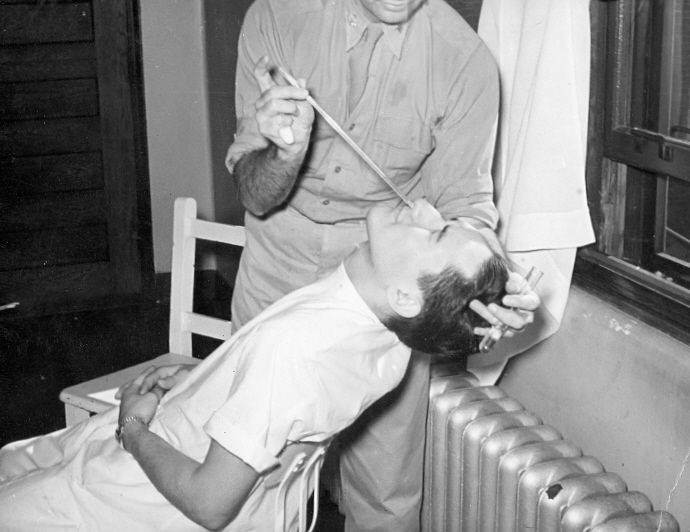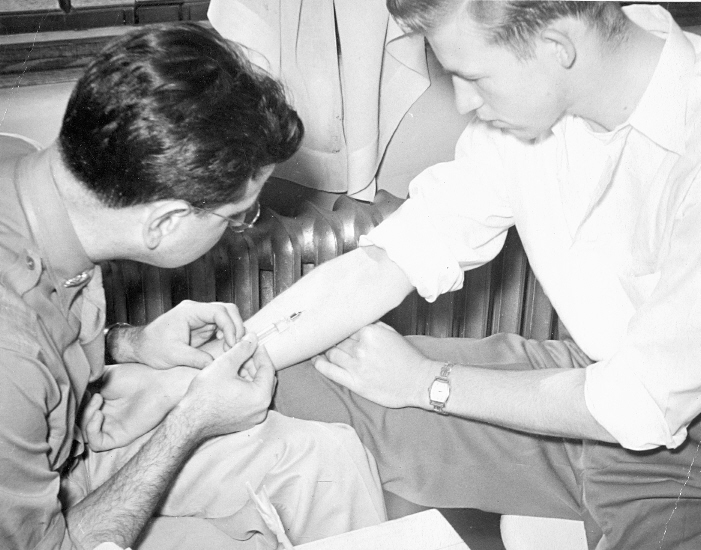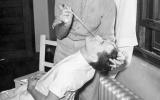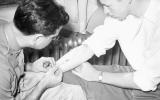CPS Unit Number 068-01
Camp: 68
Unit ID: 1
Title: Norwich Hospital
Operating agency: BSC
Opened: 3 1943
Closed: 8 1946
Workers
Total number of workers who worked in this camp: 110
-
 CPS Camp No. 68, Norwich ConnecticutMajor Havens injecting Dean C. Hoefle with material bearing infectious mononucleosis agents; May 23, 1945.Digital Image © 2011 Brethren Historical Library and Archives. All Rights Reserved.May 23, 1945
CPS Camp No. 68, Norwich ConnecticutMajor Havens injecting Dean C. Hoefle with material bearing infectious mononucleosis agents; May 23, 1945.Digital Image © 2011 Brethren Historical Library and Archives. All Rights Reserved.May 23, 1945 -
 CPS Camp No. 68, Norwich ConnecticutMajor Havens sub-cutaneously injecting G. Fred Trombley with material bearing infectious mononucleosis; May 23 1945.Digital Image © 2011 Brethren Historical Library and Archives. All Rights Reserved.May 23, 1945
CPS Camp No. 68, Norwich ConnecticutMajor Havens sub-cutaneously injecting G. Fred Trombley with material bearing infectious mononucleosis; May 23 1945.Digital Image © 2011 Brethren Historical Library and Archives. All Rights Reserved.May 23, 1945
-
 May 23, 1945
May 23, 1945 -
 May 23, 1945
May 23, 1945
CPS Unit No. 68, a Mental Hospital unit at Norwich State Hospital in Norwich, Connecticut operated by the Brethren Service Committee, opened in March 1943 and closed in August 1946. The majority of the men served as ward attendants.
The hospital served twenty-four hundred patients.
Director: Lewis Watkins, Jarrott Harkey, Channing Briggs, Dean Hoefle, Murl Huffman
Men at the Brethren Service Committee camps and units tended to report a mix of Brethren and non-Brethren denominational affiliations when entering CPS. The unit included some married men. Several of the men entered with professional and technical skills utilized at the hospital.
The majority of the men served as ward attendants, although some also worked in clerical, agricultural, maintenance and construction, motor vehicle operation, technical and professional as well as food preparation roles.
Of the 50,189 person hours performed during the life of the unit at Norwich State Hospital, ward attendants provided 40,282 hours while those serving in clerical roles gave 1,959 hours; men in technical and professional roles gave 2,461 hours and those in agriculture contributed 3,695 hours of service. (Selective Service form DSS 52 as published in Eisan p. 212)
At Norwich State Hospital, men worked fifty-four hours per week.
In a 1988 survey, one young CO physician reflected on the severe staff shortage. At the time of his arrival several staff physicians had resigned to join the military. Within ten days of the CO’s arrival, he had been asked to assume responsibility for sixteen hundred patients, which represented about sixty percent of the patient population. His patient load increased to twenty three hundred patients in a short time. The man noted,
Many of the members of the CPS unit served in a variety of administrative responsibilities at the institution, and performed in a highly satisfactory manner in carrying out their duties. Many of the wives who accompanied members of the CPS unit were given supervisory and managerial roles in the hospital and added their expertise in uplifting the quality of patient care. Among the unit, three of the members had professional qualifications in psychology and social work. Their skills were welcomed by the administration and used to good advantage in serving patients. (Sareyan p. 242)
The men lived in single or double rooms.
Eleven volunteers participated in a human guinea pig experiment with jaundice beginning in the summer of 1944. One of the volunteers, E. Kuszmaul, was in bed for forty days as a result of the inoculation, as reported in the unit newssheet This Issue. Another volunteer, Asa Mundell, described the effects of contracting infectious hepatitis. The following spring, four Norwich assignees volunteered to participate in an experiment to research infectious mononucleosis.
The hospital superintendent William A. Bryan, concerned about public relations, followed the Selective Service policy of approving work outside the hospital if it was in compliance with the number of hours allowed and type of work permitted. These decisions proved difficult for men whose only source of income to support their families came from employment in off-duty hours. The strict enforcement also demonstrated the power of hospital superintendents in the mental health units.
The Norwich paper, Norwich Bulletin, carried a series of angry letters about the CPS unit in early 1944 that asserted COS were being allowed vacations, could travel at will, held dances and parties in their rooms, and as compared to regular employees, “could get all the food they wanted”.
These letters generated rebuttals from a number of sources. On April 20, 1945, the Norwich Bulletin published the findings of an investigation by The American Legion. The report not only identified the procedure for men declaring themselves as conscientious objectors, but also observed that “the COs are not pampered, but take a lot of abuse from the regular employees”. The report went on to refute allegations of special privileges and stated that CO wives “suffer much abuse and are denied many of the perks and privileges of civilian employees at the institution” (reported in Sareyan p. 122). The report contrasted sharply with the prevailing negative reactions about CPS units from related veterans groups.
According to a report by the Brethren Service Committee assistant director Jarrott Harkey, relations with the other hospital employees and the community were good even though some people were bitter about COs. “A man who can earn respect through his work and behavior under normal conditions will have no trouble at the hospital.” (Taylor p. 190)
The hospital began an attendant training program for conscientious objectors in August 1943. In the three-month course, the hospital superintendent led the instruction, assisted by several hospital directors and assistant directors (nursing, psychological laboratories, clinical services, occupational therapy). COs received sixty hours of theoretical work combined with five hundred hours of practical work. However, by October 1943, as new COs arrived on an irregular basis, no such training was available due to personnel shortage. An effort was made, however, to give the new transfers some of the training provided for student nurses.
The men published a paper called This Issue in December 1944. Weekly Memo was later published by the unit, and copies from January 1945 through January 1946 are archived in the Swarthmore College Peace Collection.
Church of the Brethren Archives, Elgin, Illinois.
For information on Brethren mental health and training school units see Leslie Eisan, Pathways of Peace: A History of the Civilian Public Service Program Administered by the Brethren Service Committee. Elgin, IL: Brethren Publishing House, 1948, Chapter 6, pp. 205-238.
For more information on women COs see Rachel Waltner Goossen, Women Against the Good War: Conscientious Objection and Gender on the American Home Front, 1941-47. Chapel Hill, NC: The University of North Carolina Press, 1997.
See also Alex Sareyan, The Turning Point: How Persons of Conscience Brought About Major Change in the Care of America’s Mentally Ill. Scottdale, PA: Herald Press, 1994.
Swarthmore College Peace Collection, Camp publications database.
For more in depth treatment on mental health units and training schools, see Steven J. Taylor, Acts of Conscience: World War II, Mental Institutions, and Religious Objectors. Syracuse, NY: Syracuse University Press, 2009.